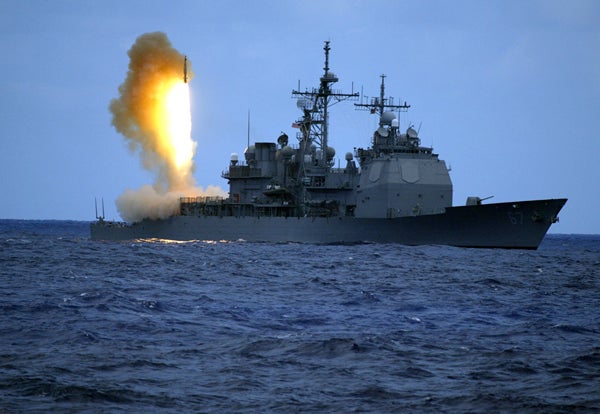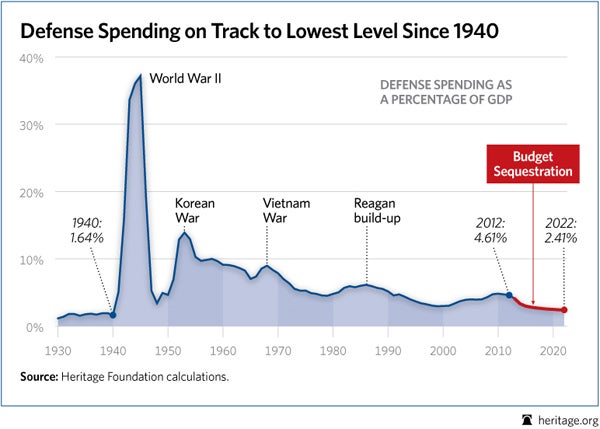Last week North Korea successfully launched an Unha-3 rocket, thereby demonstrating an alarming capability to target U.S. territory with ballistic missiles. China is rapidly expanding its fleets and arsenals in an unprecedented military build-up, while intimidating other countries in East Asia—including U.S. allies. The Middle East is a conflagration of instability.
Meanwhile, the Obama Administration and Congress have put U.S. defense spending on track to pre-World War II levels—a time when America was not a superpower and not leader of the “free world.”
In the face of soaring national debt, a budgetary impasse, and the absence of presidential leadership to provide for the common defense, Congress must decide whether or not America will have the material capabilities to continue its leading role in international affairs.
As argued in our recent Heritage Backgrounder, “Sequester Decision Time,” the 112th Congress should consider America’s historical path to world power and the principles that have guided it—as well as the probable costs of a real and relative decline in U.S. hard power.
Rapidly and automatically growing spending on entitlement programs is taking over a larger and larger share of federal spending. This puts pressure on other budget priorities, including national defense. Congress should not sacrifice American strength abroad for failure to control spending at home.
If the sequester takes effect, U.S. defense spending will be cut by $500 billion over the next decade, in addition to the $800 billion in reductions already made by the Obama Administration. These combined cuts will lower U.S. defense spending to pre–World War II levels as a percentage of GDP and severely undermine the U.S. military’s ability to accomplish its current and anticipated operational tasks.
In practical terms, the U.S. will have the smallest land force since 1940, the smallest navy since 1915, and the smallest tactical fighter air force ever. Despite technological improvements and increased firepower, sheer numbers of troops, ships, and fighter jets have a strategic value in themselves because no soldier, ship, or jet can be in two places at once.
Meanwhile, the needed modernization of America’s armaments will be delayed indefinitely. U.S. Secretary of Defense Leon Panetta has described this prospect as “devastating,” considering that America is “within an inch of war almost every day.”
In the midst of the current budget battle, many on both the right and the left assume that defense spending is a luxury that America can no longer afford. This view is far removed from both historical experience and the U.S. government’s priorities as delineated by the U.S. Constitution.
The Framers of the Constitution shared James Madison’s conviction that “security against foreign danger is…an avowed and essential object of the American Union.” They understood that certain goals listed in the Constitution—justice, domestic tranquility, and the general welfare—entailed the absence of government activity beyond establishing a framework for representative lawmaking and impartial adjudication. By contrast, the Constitution enumerates many specific powers in order to provide for the common defense. When it comes to government activity, national security is the core priority of the U.S. government.
While the 21st-century global challenges to America’s interests and ideas are great, the U.S. can be well poised to face them. Hence, if the U.S. relinquishes its position as leader of the free world, it will do so because Americans and their elected representatives have decided to abandon it. Before making such a decision, they should remember that the vacuum left by America’s chosen decline will be filled by other powers with very different ideas of international order.
Read More: Sequester Decision Time: Global Leader or Regional Hegemon?

